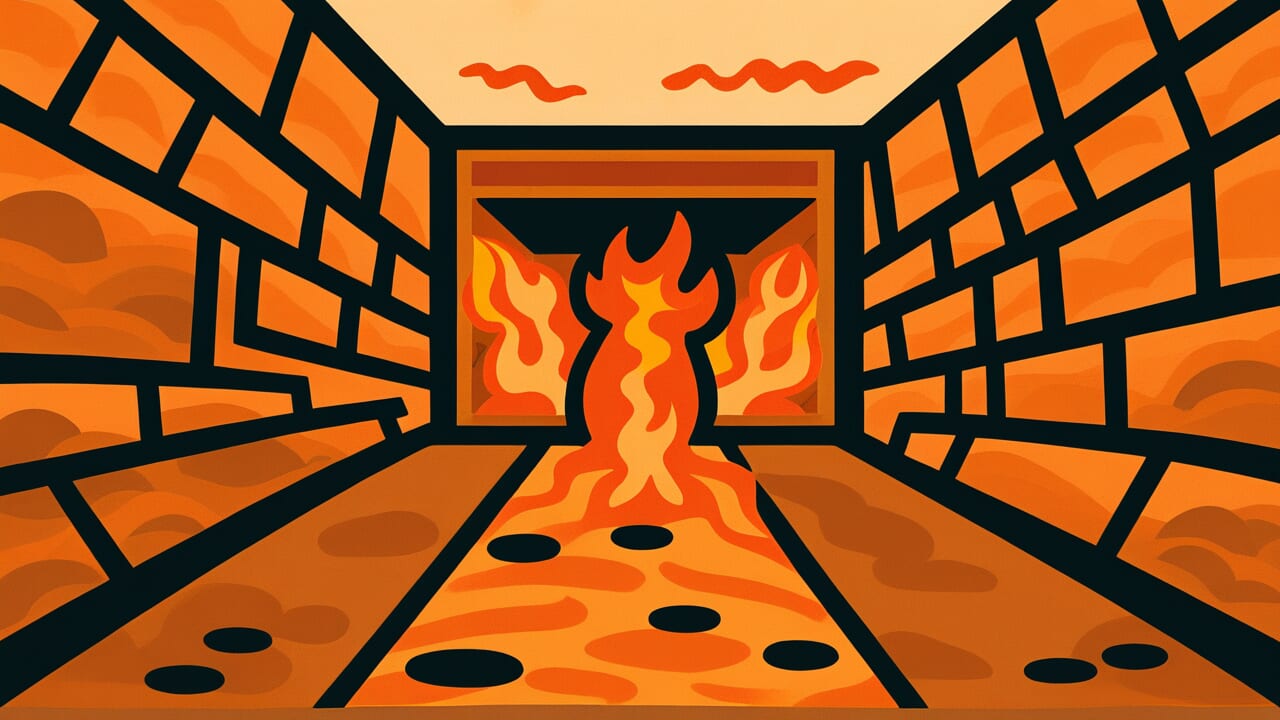How to Read “Hell is one wall away”
Jigoku wa kabe hitoe
Meaning of “Hell is one wall away”
“Hell is one wall away” means that happiness and misery, heaven-like conditions and hellish situations, are separated by only the smallest difference.
Even when you’re living happily now, a small event or wrong decision can suddenly plunge you into suffering.
On the flip side, even when you think you’ve hit rock bottom, a tiny change can bring a ray of hope.
This proverb is used to express life’s instability and unpredictability. It appears when teaching the importance of staying humble and careful during good times.
It’s also used to encourage people facing hardship. In modern society, our lives constantly face potential changes.
Economic shifts, health problems, relationship troubles can strike anytime. The daily life that seems stable is actually separated from crisis by just one thin wall.
This proverb reminds us of this reality.
Origin and Etymology
The exact first appearance of this proverb in literature is unclear. However, it’s believed to have emerged from Buddhist thought.
In Buddhism, paradise and hell are depicted as opposite worlds. But the teaching says that depending on human actions and mindset, one’s circumstances can easily change.
“One wall away” means the distance of just one thin wall. It refers to the tiniest separation.
In traditional Japanese houses, rooms were separated by thin shoji screens or fusuma sliding doors. Different spaces truly existed just “one wall away.”
This familiar architectural style became a metaphor for expressing abstract concepts.
The recognition that happiness and misery are neighbors developed within Japanese culture, which values the concept of impermanence.
A life that seems smooth sailing can suddenly turn dark from a small trigger. Conversely, even when you think you’re at the edge of despair, a small ray of hope can shine through.
This short phrase beautifully captures life’s uncertainty and the blurred boundary between fortune and misfortune.
Usage Examples
- A thriving business collapsed from one wrong decision—truly, hell is one wall away
- I only realized how blessed good health is after getting sick—hell is one wall away indeed
Universal Wisdom
The universal truth shown by “Hell is one wall away” is the fragility of human destiny and the need for humility that comes from it.
We all want to believe our lives are somewhat controllable. We want to think that effort brings rewards, that living right brings happiness.
But in reality, no matter how carefully we live, unexpected events can transform our lives.
This recognition isn’t pessimistic at all. Rather, it teaches us the preciousness of happiness in this very moment.
It makes us realize that the daily life we take for granted is actually very precious and fleeting.
Being healthy, having loved ones nearby, spending peaceful days—none of these are guaranteed forever.
At the same time, this proverb also gives us hope. Even if now feels like hell, situations can change.
Beyond that one wall, unseen possibilities spread out. Accept life’s ups and downs.
Be grateful in good times, keep hope in bad times. This flexible mindset is the wisdom this proverb has conveyed to us over many years.
When AI Hears This
In physics, water remains liquid no matter how much you heat it to 99.9 degrees. But the moment it crosses the critical point of 100 degrees, it suddenly transforms into gas.
The essence of this phase transition phenomenon is that change isn’t continuous but discontinuous. It doesn’t “gradually change” but “suddenly changes at a certain moment.”
What makes this proverb frightening is that it captures exactly this nature of phase transitions. Happy states and hellish states aren’t actually connected continuously.
For example, someone with 4.99 million yen in debt differs from someone with 5 million yen by only 10,000 yen in amount.
But if 5 million yen is the critical point of unpayable debt, that 10,000 yen difference causes life to transition into a completely different state.
Just as water at minus 1 degree is solid and water at plus 1 degree is liquid, a mere 2-degree difference completely changes the state of matter—it’s the same structure.
Even more interesting is the physical law that systems become extremely unstable near critical points. Water about to boil suddenly boils from a small stimulus.
Similarly, people near the boundary between happiness and hell experience sudden state changes from trivial events.
The expression “one wall away” perfectly captures this essence of phase transitions—”quantitatively close but qualitatively separated”—without using scientific terminology.
Lessons for Today
What this proverb teaches us living in modern times is to cherish our current happiness without taking it for granted.
When your career is going well, when you’re healthy, when your family is safe—these peaceful days are actually the most precious.
Instead of envying others’ glamorous lives on social media, try looking at the small happiness at your own feet.
At the same time, this proverb offers hope to people in difficult situations. No matter how painful now is, situations can change.
By moving forward one step at a time without giving up, by valuing small changes, you might break through to the other side of the wall.
Most importantly, this recognition makes us humble and nurtures compassion for others. Those doing well don’t become arrogant and don’t look down on people facing difficulties.
Understanding that everyone walks along the boundary line between fortune and misfortune might be the first step toward creating a kinder society.



Comments